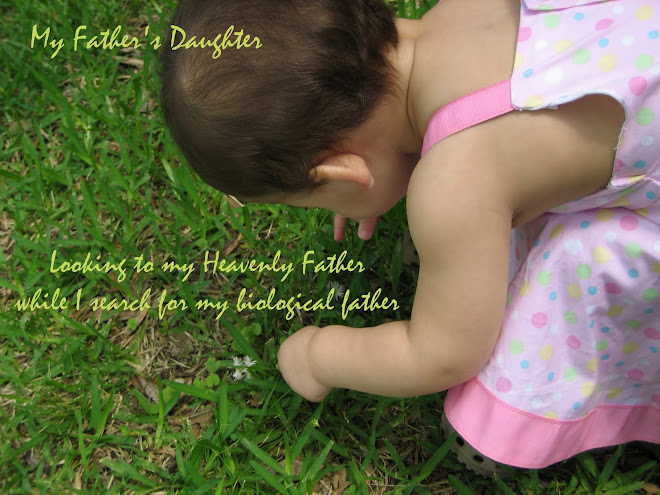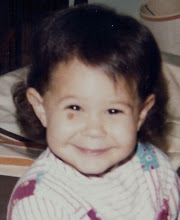I posted this on FamilyScholars.org the other day. Thought I'd put it here, too. There were several good comments if you want to jump over there and read them.
***********
After finding out that my parents used a sperm donor to conceive me, the first place I went to on the Internet to find support was a bulletin board of moms that I frequented. It didn’t occur to me to use Google to find other donor conceived people. I just went to the sites I always went to. I posted a message asking if anyone was conceived with a sperm donor.
My very first reply was from a lady whose sister had used a sperm donor, and the little girl was about 3. This lady told me that I needed to write my parents a thank you note for raising me. She was very hostile and rude about it.
I don’t think I was mad about it so much as I was hurt. I needed someone to throw me a lifeline to pull me out of the depth of despair that was taking over my life, and she threw me a ton of bricks to sink me even deeper.
Since then, I’ve had a few responses that I assume were not well thought-out before they came out of the person’s mouth. I’ve been told that sperm donation is like giving blood, and that it’s like adoption. A couple of people have asked if I still think of my (social) dad as Dad.
So I’d like to clear up a few* misconceived ideas about donor conception. Please note that feelings about donor conception vary greatly from person to person. Sometimes, feelings vary greatly within just one person; they may be fine with it one day, and angry about it the next day.
I enlisted the help of several donor conceived people who contributed some of the misconceptions that they’ve heard from people. My thanks to you.
Misconception #1: “My Daddy’s Name is Donor.” The term “donor conceived” is actually an inaccurate term for most of us. Our fathers (or mothers in the case of egg donations) never “donated” gametes, but were paid for their services. A donation is what is given out of the generosity of heart, but money exchanged for goods is called a transaction. “Transaction conceived” doesn’t really have a nice ring to it, though, does it?
Misconception #2: The donor is not a parent. Once I got over the initial shock of this new reality, I realized that there is a man out there who is my biological father. Not just a “nice man” who helped create me, but an actual father; a man with whom I have a real substantial connection. Please realize that donors are not like McDonald’s where you can go and pick up a Dr. Pepper. I can buy a Dr. Pepper from McDonald’s close to home or three states away and it will be pretty much the same. I can even go to Wendy’s and get the exact same Dr. Pepper as McDonald’s.
A man and his sperm are not like a restaurant and its soft drinks. No man is exactly like another man, and his sperm is not exactly the same as another man’s sperm. The DNA that my father contributed to my creation cannot be duplicated by anyone else (unless he has an identical twin). My father’s sperm is uniquely his. I, Stephanie, exist because his sperm containing his unique DNA fertilized my mother’s egg with her unique DNA. He helped create me. He isn’t my Dad, but he is my father.
Misconception #3: Agreeing to parent another man’s child makes a man a Dad. This may or may not be true, depending on the man. Not all donor conceived people have good relationships with their social fathers. I am so blessed that I have a fantastic Dad who raised me. But many social fathers never really become “Daddy” to the child who was conceived with another man’s sperm. I think it takes a really special man to become a Dad (and by the name Dad, I’m implying that there is a special affectionate relationship to the child and he’s not just an authority figure) whether it is through donation, adoption, step-parenting, or any other situation in which a man finds himself parenting.
Misconception #4: Really wanting a child makes you a good parent. Even when a child is “really wanted,” it doesn’t guarantee that “really wanted” translates into good parenthood any more than getting pregnant by surprise makes a person a good parent.
As for a person being told that they were “really wanted,” one woman put it this way: “Well actually, NO! The baby my parents REALLY wanted was the one they could never have. I was just their second best option.”
Misconception #5: Using a donor is a cure to infertility. A cure to infertility is getting a couple pregnant using their own gametes when pregnancy wasn’t happening previous to the cure. Using a donor doesn’t make a couple fertile – it simply gets the woman pregnant using another man’s sperm. The husband/partner is still infertile.
Misconception #6: Every DC person wants a relationship with their non-present biological parent. Not every donor conceived person wants to find their biological father. Not everyone wants him to stay anonymous, either. People may bounce back and forth between both emotions over time. Some may want varying degrees of “knowing” – anywhere from a full-blown relationship to just seeing a picture and knowing a name. Others may just want a medical history. It’s not a safe assumption to think you know how a person feels about having knowledge about their biological parent. They themselves may not know what exactly they want.
Misconception #7: Donating sperm/eggs is like donating blood. Blood sustains life that already exists. Sperm/eggs are necessary to create life. I see no comparison at all.
Misconception #8: My child doesn’t need their biological parent. I/We are all they need. I’ve read it in the comments, both here and other places; couples feel that their love will fill all of the spaces in the child’s heart. I do want to say this as gently, but clearly as possible, because I’m aware that the love that a parent has for a child is so incredibly important. You are important to the child, whether you are the biological parent or not. If you are there in the child’s life, and you play the role of a loving parent, your child does need your love. No child can have too much love. But please understand that a child who grows up wanting to know who their biological parent is probably isn’t rejecting your love. There is just a need in many of us to know who they came from. You can never fill that hole in their heart. It isn’t because you aren’t a good enough parent. It’s because the hole is in the shape of the missing biological parent, and no matter how hard you try, you won’t fit into that shape any more than a square is going to fit into a round hole.
Misconception #9: Looking for my biological father means that I don’t love the man who raised me. False. The man who raised me is my Dad and always will be. Searching for my biological father in no way negates my love for my Dad. I have five children and I love all of them with my whole heart. I didn’t run out of love after the first one. That’s the great thing about love – loving one person doesn’t mean that there is no love left for anyone else. I love my Dad. I am interested in finding my father. These realities don’t cancel each other out. They coexist.
Misconception #10: Donor conception is just like adoption. Adoption happens when a child cannot be raised by his/her family for whatever reason. The parents are deceased or unfit or unavailable to take care of their child (or in some cases, forced to give up their child). The child isn’t generally created with the purpose of giving them away to another family.
Donor conception, on the other hand, is purposefully endeavoring to create a child who will never know or be with half of their biological family. The missing family will either be replaced by the mother’s partner’s family, or completely discarded all together (as in the case of single parents). Before the child is even created, half of the family tie is severed.
Misconception #11: All donor conceived people have a victim mentality. “Victim” is defined as “one that is acted on and usually adversely affected by a force or agent.” I would say that I have absolutely been adversely affected by a force or agent. I know that there are others who would say the same thing. But a victim mentality? No. I see men and women who are working hard to change laws around the world to protect those who haven’t yet been conceived in this manner from the pain that we endure. The blogs and articles I’ve read are about people who are trying to affect change within culture by making society aware of this situation.
(*There are SO MANY MORE misconceptions regarding donor conception – Tangled Webs UK is a great resource to read more about it. Check it out here and here.)
Copyright 2009-2011
Tuesday, September 21, 2010
Subscribe to:
Post Comments (Atom)



Akkkk! You wrote this?! Oh my gosh its one of my very favorite peices of writing on this topic! Wow I feel like I met a celebrity now!
ReplyDeleteYou really are quite a gifted writer. I'd suggest that you take personal inventory of things that are special about you - things unrelated to your appearance and incorporate those things into the profile of of your father and other relatives because they very likely embody those same strengths and weaknesses. For instance its likely that your father writes articles for professional organizations that he is affilliated with. He may also be involved in public speaking that mirrors what your activities associated with ministering although it might be something closer to motivational speaking for instance or like counsels people. He May come from a family that has lots of boys since your mom popped out two girls and from what I gather you are pretty much a go to girl for a husband that wants a bunch of sons. Things like food aversions, aptitudes for languages music stuff like that. Its not all about what you look like. Remember he's half of who you are without even having a chance to influence your behavior on a daily basis, thats pretty powerful and it goes far beyond brown eyes.